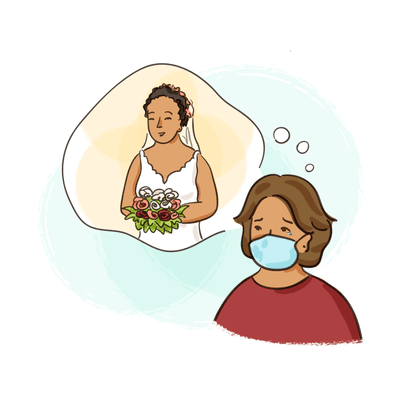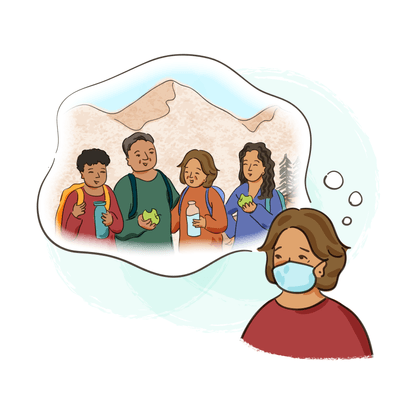Living with Metastatic Breast Cancer

About Metastatic Breast Cancer
In this course, learn about metastatic breast cancer, how it differs from early-stage breast cancer and how care options can improve quality of life.

Meet Mariana. She likes to be outdoors, hike and to paint. Spending time with family and being active are really important to Mariana.

To celebrate her birthday last weekend, Mariana and her family had a large outdoor celebration. They indulged in some treats, a nice break from Mariana’s relatively healthy eating habits.

About 6 years ago, Mariana was diagnosed with early-stage breast cancer. It was only in her breast and some nearby lymph nodes. Early-stage is considered Stages 1 through 2. She had Stage 2.

After treatment, Mariana was declared to have no evidence of disease (NED). She still gets regular mammograms—detailed x-ray pictures of her breasts—and other scans.

Over the past 6 years, Mariana has continued to have regular checkups with her oncologist. Today, she is at a follow-up appointment after she had some scans done last week. This part never gets easier.

“I don’t have good news Mariana. It looks like you have recurrent breast cancer. It’s back and it has spread, or metastasized, to other parts of your body,” the doctor says.

”In your case, Mariana, it has spread to distant lymph nodes and your lung. Unfortunately, this means that we are looking at Stage 4 metastatic breast cancer.”

Mariana feels numb and is scared. However, she knows a lot more than she did when she received her first diagnosis.

“Unlike when you had your first diagnosis, this time there is no cure. However, there are many care options that may help you live longer with a high quality of life,” her doctor says.

This scares Mariana. In tears, she asks “How long? Will I be able to see my daughter’s wedding?” Her head is spinning but at least she knows a lot more this time around.

“Let’s discuss all of your care options. There are long-term care options that will be ongoing,” her doctor explains. “And you may be eligible to participate in a clinical trial.”

“A clinical trial helps researchers test potential new drugs and treatments for breast cancer,” her doctor says. “It also helps us to closely monitor your progress and manage your care.”

Mariana’s thoughts are racing—she feels uneasy about being part of a clinical trial. She thinks they sound a bit scary. “I will discuss the options with my family,” Mariana says. Her doctor adds, “We can always try a combination of care options as time goes on.”

Over the next few weeks, there are a lot of changes. Mariana’s husband supports her by taking on more responsibilities. Mariana also stops taking calls from friends and family.

Mariana often feels tired but still tries to attend as many weekly activities with friends and extended family as she can.

Mariana’s husband understands that sometimes she needs a break from social events and other obligations. He encourages her to do what she needs.

A couple of weeks pass, and Mariana continues to ignore phone calls. Today, Mariana’s Aunt Alma calls. They’ve always been really close, but they have not talked for a couple of weeks.

Despite ignoring Alma’s calls in the past, Mariana decides to pick up the phone. “Where have you been? I miss you!” Alma asks.

“I’m tired.” Mariana says. “Sometimes it’s physically. Sometimes it’s mentally. And I don’t feel like anyone understands. I don’t want to be a burden.”

“Help me understand,” Alma says. The women talk for over an hour. Mariana explains that she will have ongoing treatment and Alma asks how she can support her.

Mariana realizes that she doesn’t want to avoid everybody’s phone calls anymore. It has been nice to talk to someone. She tells Alma that she looks forward to seeing her soon.

“It felt really good to get all of that off my chest and teach someone more about metastatic breast cancer,” Mariana tells her husband later that evening.

“You’ve taught me so much, too. You’re good at explaining!” he tells her. “Maybe you could help spread awareness about metastatic breast cancer and help others.” That sounds like a good idea to Mariana.

Mariana begins reading more about metastatic breast cancer and other patients’ stories. She continues to attend weekly activities and joins a local advocacy group.

One day, Mariana reads about another Hispanic woman who decided to participate in a clinical trial. Minority populations are often underrepresented in clinical trials.

Mariana wants to help change that. Race, ethnicity, age and sex can all impact how different people respond to the same medicine, so it is important to have diversity in clinical trials.

Mariana begins to think about clinical trials in a new way. She decides to research them more and thinks about how she may be able to help future patients.

Mariana decides that she will discuss clinical trials with her oncologist at her next appointment. Together, they can decide if it is an appropriate option for Mariana’s care plan.

Over the next several months, Mariana sees her doctor regularly, attends her son’s sporting events and paints. She continues to help plan her daughter’s wedding.

The big day finally arrives, and Mariana is feeling good. Toward the beginning of the reception, Mariana receives a text from her doctor.

Her doctor has found a clinical trial that she thinks might be a good fit for Mariana. Mariana smiles. For once, she looks forward to seeing her doctor on Monday.
Summary:
- Metastatic breast cancer, or Stage 4, has no cure. However, care options may prolong survival with a high quality of life. Learn more at cancercare.org and cancer.org.
- Clinical trials have the potential to shed light on new treatments. Including diverse populations in clinical trials is important.
- Explore Lilly’s Breast Cancer Clinical Trials here: LillyBreastCancerTrials.com

ARTIST
Elfy Chiang
Elfy is an artist and science communicator from Taiwan with a background in biological sciences.

"Lilly unites caring with discovery to make life better for people around the world."